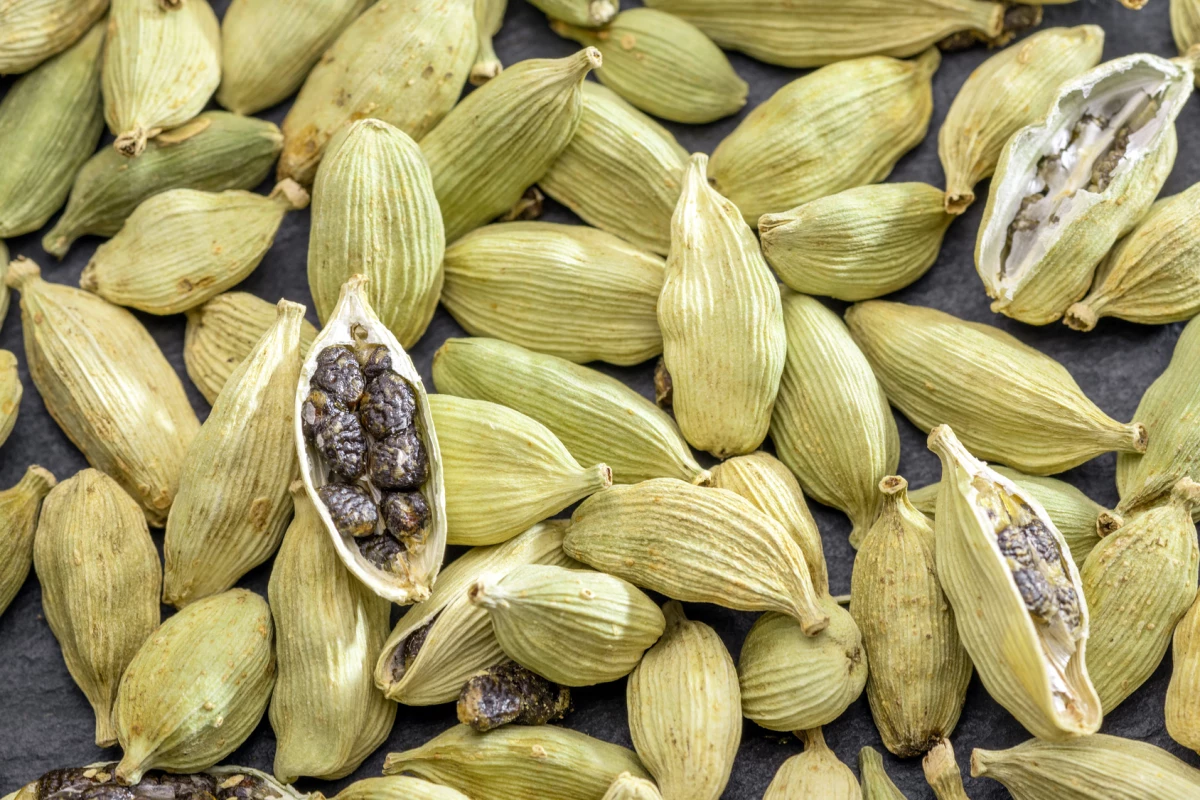Health
Cardamom Extract Boosts Antiviral Response in New Study

Research from Shinshu University in Japan has revealed promising antiviral properties in a common kitchen spice: cardamom. The study indicates that compounds found in cardamom seeds may enhance the body’s response to viral infections, potentially leading to natural treatments for ailments such as the common cold and influenza.
The focus of the research is on the role of Type I interferons (IFNs), proteins that act as the body’s primary defense mechanism against viral threats. These proteins bind to receptors on both infected and uninfected cells, prompting them to produce numerous interferon-stimulated genes (ISGs). This process establishes an “antiviral state,” which significantly limits viral replication.
In the study, led by Takeshi Kawahara, an Associate Professor at the university’s School of Science and Technology, the researchers evaluated a hot-water extract from cardamom seeds. “We have been researching food ingredients that can prevent viral infections in our daily life since before the emergence of the novel coronavirus,” Kawahara stated. He noted that the pandemic has intensified interest in the antiviral properties of food.
Investigating Cardamom’s Antiviral Potential
The researchers utilized human lung epithelial cells, which line the respiratory tract, to study the extract’s effects. These cells serve as a model for assessing respiratory viruses such as colds and flu. Through gas and liquid chromatography, the team identified 1,8-cineole as a major component of the cardamom extract. This compound is recognized for its anti-inflammatory, antioxidant, antimicrobial, and analgesic properties and has a history of use in traditional medicine.
When exposed to the cardamom seed extract (CSWE) and 1,8-cineole, the lung cells were also subjected to molecules designed to mimic viral DNA and RNA. The results demonstrated that CSWE significantly increased the levels of IFN-α and IFN-β, both critical antiviral molecules. Moreover, the extract enhanced the expression of ISGs, indicating a robust antiviral response. This enhancement occurred regardless of whether the viral mimic was DNA or RNA, suggesting a broad-spectrum activation of immune pathways.
Additionally, the study found that 1,8-cineole elevated IFN and ISG levels in a dose-dependent manner. Remarkably, this effect occurred even in the absence of simulated infection, suggesting the compound may help maintain a state of readiness in cells.
Mechanisms of Action and Future Implications
The mechanisms through which CSWE and 1,8-cineole operate differ significantly. The extract’s antiviral effects were linked to the STING pathway, a built-in cellular “virus sensor” that detects viral DNA and prompts the production of IFNs. In contrast, 1,8-cineole activated IFN production by inhibiting a gene known as TIPARP, which ordinarily dampens the immune response. This dual action enhances the body’s ability to respond to viral threats without triggering harmful inflammation.
Despite these encouraging findings, the researchers acknowledged limitations. All experiments were conducted using lab-grown cells, which do not fully replicate human physiology. Additionally, the concentrations used in the study may not be achievable through normal dietary consumption of cardamom. The research was funded by S&B Foods Inc., which also provided the cardamom used in the study.
Should future research validate these findings in human subjects, cardamom extract or 1,8-cineole could be developed as a natural immune booster. This could serve as a preventative measure against viral infections or as a complementary treatment alongside vaccines and antiviral medications.
“Cardamom has historically been widely used as a spice with medicinal properties, but based on these findings, it is expected that it can be utilized as an antiviral material to prevent a wide range of viral infections,” Kawahara concluded. He stressed the importance of this research in broadening our understanding of the antiviral properties of food and its potential role in everyday health.
The study was published in the journal Foods in March 2024, but it is essential to note that these findings are preliminary and should not replace established medical advice. Cardamom tea alone is not a substitute for vaccines or antiviral medications.
-

 Science2 months ago
Science2 months agoOhio State Study Uncovers Brain Connectivity and Function Links
-

 Politics2 months ago
Politics2 months agoHamas Chief Stresses Disarmament Tied to Occupation’s End
-

 Science1 month ago
Science1 month agoUniversity of Hawaiʻi Joins $25.6M AI Project for Disaster Monitoring
-

 Entertainment2 months ago
Entertainment2 months agoMegan Thee Stallion Exposes Alleged Online Attack by Bots
-

 Science4 weeks ago
Science4 weeks agoALMA Discovers Companion Orbiting Giant Star π 1 Gruis
-

 Science2 months ago
Science2 months agoResearchers Challenge 200-Year-Old Physics Principle with Atomic Engines
-

 Entertainment1 month ago
Entertainment1 month agoPaloma Elsesser Shines at LA Event with Iconic Slicked-Back Bun
-

 World1 month ago
World1 month agoFDA Unveils Plan to Cut Drug Prices and Boost Biosimilars
-

 Business1 month ago
Business1 month agoMotley Fool Wealth Management Reduces Medtronic Holdings by 14.7%
-

 Top Stories2 months ago
Top Stories2 months agoFederal Agents Detain Driver in Addison; Protests Erupt Immediately
-

 Entertainment1 month ago
Entertainment1 month agoBeloved Artist and Community Leader Gloria Rosencrants Passes Away
-

 Science2 months ago
Science2 months agoInnovator Captures Light at 2 Billion Frames Per Second









